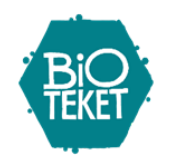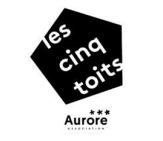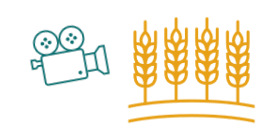
Bioteket is a volunteer- based green culture hub for sustainability, where science, culture, art and green activism flouris together. Established in 2016 , Bioteket is a secret treasure in Nørrebro, Copenhagen. It is made of upcycled and refurbished shipping containers on two levels:
A Workshop, laboratory, and growing space for mushrooms on the ground level, and a greenhouse that accommodates the growth of plants, fish, insects, social events, and sustainable ideas on the first floor. Furthermore, there are open gardens and community gardens connected to the space.
Quick facts
Founded 2016
Based in Copenhagen, Denmark
SDGs impacted by the companies’ activities: 11 , 12 , 13 , 15 and 17
How does the organisation address societal challenges in an innovative way?
The Home is a 251 hectares estate for change- makers to connect, learn and deepen their connection to nature, themselves and others. The estate can be used to work, for taking part in impact- related events, join retreats and organize own individual events. The place offers homegrown organic food, fresh water from the mountains, and rivers, silence, and a warm and comforting place to stay, including suites for some extra luxury members. There are also tents in the forest to be even closer to nature. The home facilitates inspiring people to meet each other, share knowledge, and visions and grow.
How does the organization address societal challenges in an innovative way?
The Project aims at tackling global issues by acting local. One aspect that they are working towards is the democratization of access to knowledge about nature and science, and how it relates to citizens’ lives. Thus, the project welcomes people of all ages and nationalities to join and co- create together, physically, and virtually.
Cross- communities collaborations are fostered and cherished. Furthermore, they aim to facilitate knowledge acquisition and transfer in a fun way. They offer the opportunity to learn about, play with, and subsidize experiments on sustainable urban living in all its forms.
What societal benefit does the organization create?
It gives people a space to develop and grow natural produce, work and think in sustainable and ecological ways than they previously would have done. It enables people to become more self- sufficient and contribute to a healthier and more sustainable local environment. Bioteket participates in events and develops workshops throughout the year on various topics that foster the ethos of sustainability, culture and inclusion. The skills below can offer people new pathways to business creation in sustainably produced food and drinks, it can also inspire people to bring sustainability training to their own workplace.

Bioteket activities are mainly focused on sustainability and green culture is fostered by citizens across the region. For example, on Saturdays, the volunteer- driven food-sharing CPH distributes free surplus fruits and vegetables from Bioteket. Permanently located in a rebuilt container, Bioteket serves as a design- and culture house, focusing on organic gardening projects and communities for both children and adults.
They, furthermore, run projects such as “ Taste the waste”, which was about enabling people to think about the food waste created every day. The event aimed to help families reimagine and understand food together in a community while having dinner.
The Sensory Garden was another initiative produced by Bioteket in collaboration with the IT University of Copenhagen. The goal was to make the space outside Bioteket more inviting while creating awareness about Bioteket among locals by enticing them to participate in a playful activity in green surroundings. The f inal design is a plant bed placed outside Bioteket with a screen hanging above it. The screen invites passers- by to interact with the plants by touching them. Touch is registered by the MPR121 capacitance sensor which activates sound and the screen to display information about Bioteket.

Quick facts
Based in Paris, France
Cooperation of two NGOs
SDG Goal 11 , 12 and 15
Located in former military barracks, the “Five Roofs” project is a social innovation project at the heart of Paris. The project is an example of transitional urban planning at the service of social inclusion and is led by the “Aurore Association” which f ights against exclusion by offering access to accommodation, care, and professional integration. They partnered up with “ Plateau Urbain”, an urban planning cooperative which works to turn vacant urban spaces into social and cultural hubs.
The social innovation project Les Cinq Toits builds the community and brings people together through a range of activities.
Over 350 people are living on the premises in emergency housing. The space furthermore houses 35 craftsmen, artists, social entrepreneurs, and NGOs ( partner structures) to create an economic, social and cultural hub to support social inclusion. The site is open to the public and offers a range of activities for people from various backgrounds to come together and meet. On the premises, one can f ind a solidarity restaurant, a small garden, a bike repair centre, and a shared DIY workshop as well as an engaging event program.
How does the organization address societal challenges in an innovative way?
The purpose and main objectives of the project are to offer a space that can be used for a range of activities and to bring people from different backgrounds closer together. On the premises of Les Cinq Toits local residents come together with refugees and migrants to discover each other’ s cultures and to improve mutual understanding. The project utilizes the vacant space to promote social inclusion and thus helps to shape a solidary urban development. At the project site, visitors are being educated about issues of migration as well as environmental challenges. Furthermore, vocational training and employment are offered to those in need.
What societal benefit does the organization create?
The work of Les Cinq toits creates societal benefit by working for the following objectives:
strengthen the relationship and understanding between the public and the residents amplify the active participation of all offering holistic support to people in need promote access to education, training and employment improving neighbourhood relations
Advocacy and awareness of societal and environmental challenges
What new urban trades are created in the project?
The multitude of activities and audiences at Cinq Toits make it an ideal place to offer vocational training and employment for the refugees residing there. The project offers refugees the opportunity to gradually integrate into the workforce by offering comprehensive socio- professional support such as job training, help to f ind housing, legal help, access to healthcare and professional integration. The offered support allows socialization through work and, more broadly, the integration into the French work environment for people who have never worked in France. There are also opportunities to learn French.
What makes the organization particularly interesting as an example?
The project especially inspiring because it successfully combines multiple societal, environmental and economic objectives: It offers people in need comprehensive support as well as enhances cultural understanding and integration into the local community. It furthermore, provides a social and cultural hub in the centre of Paris with many different events and provides space for local organizations and artists. Lastly, many of the operations are environmentally friendly and targeted at spreading awareness about environmental issues. Thus, Les Cinq toits is a great example of how to successfully combine many sustainable objectives.

The association de l' Autre Champ works to promote cultural knowledge and understanding through indoor and outdoor f ilm screenings for the local residents.
Furthermore, they offer workshops in content creation to allow participants to take ownership of the creative process.
How does the organization address societal challenges in an innovative way?
Since 2016 the association is based in a community garden which enables them to collectively expand their agricultural know- how, as well as invite everyone to apply these practices. Thanks to a tunnel greenhouse, hundreds of seedlings are carefully planted and maintained collectively every year. Most of them are distributed to local gardeners during open days, as well as the dozens of varieties of seeds that make up our seed library, which is enriched a little more each season.
What societal benefit does the organization create?
The association has been utilizing the garden for pedagogical workshops, and harvesting activities, as well as to produce seeds. Not to mention the outdoor screenings, the thematic evenings and the shared meals which characterize the life of the garden. It is through this diversity of actions that the garden has gradually become a central place in the life of the neighbourhood. Through the workshops and screenings, l' Autre Champ works to make cinema accessible as a universal mode of expression. They create a cinema of experience, open to all, with its imperfections and its limits, but also all its authenticity in its practices and the liveliness of its stories.
What new urban trades are created in the project?
The association is planning to establish a new project collectively with all the inhabitants. The " Open Fields" project is intended to facilitate local development. It aims to open new inclusive and supportive spaces of sharing and development, as well as awareness of ecological urban farming practices and the safeguarding of biodiversity in urban areas. The idea is to facilitate activities regarding outdoor education, establish a garden of aromatic and medicinal plants, a collective henhouse as well as actions of recovery of unsold organic vegetables. Further, there will be spaces for inter- generational interaction and social inclusion. This project will not necessarily create one new urban trade, however, it will facilitate the necessary knowledge and understanding to advance urban resilience and is thus a great example.

Cartiera is a social enterprise that makes and produces accessories made of leather and fabric. The enterprise is registered into the regional social cooperatives register and it has received several awards, such as Worth and EU4 Fair.
Weaving together Italian leather and African fabric, Cartiera makes bags, purses, clutches, backpacks, rucksacks, shopping bags, cases, object holders, change purses, business card holders, wallets, laptop and tablet cases. Simple objects, made with care and designed to be useful in everyday life. Cartiera is a “ Made in Italy” like never before.
Quick facts
Located in Marzabotto, Bologna, Italy
SDGs impacted by the company’ s activities: 1 , 3 , 8, 9 , 10, 11 , 12 , 13 , 17
Ethical fashion enterprise that offers concrete responses to the challenges of our time
Focused on inclusion, refugees, circular, re- population, climate, education
What new urban trades are created in the project?
With the aim of combating the risk of social exclusion, Cartiera’ s priority is the work placement of migrants, asylum seekers, and unemployed people working in an area characterized by strong depopulation and high poverty risk.
The Cartiera project intends to provide concrete answers in terms of inclusion starting from the Sustainable Development Goals set by the 2030 Agenda: SDG 1 - Overcoming poverty. Cartiera offers work to people in conditions of economic hardship, including migrants and asylum seekers.
SDG 3 - Health and well- being. Cartiera cares about the training and the individual path of its employees.
SDG 8 - Decent work and economic growth. Cartiera guarantees decent working conditions and encourages lasting, inclusive, and sustainable economic growth.
SDG 10 - Reduce inequalities. Cartiera contributes to the social cohesion of its local community, and it is a partner of the Ethical Fashion Initiative. This United Nations program promotes the development of migrants' countries of origin.
SDG 17 - Partnership for the objectives. Cartiera works within an international network that considers migration as a stage in a circular development process.
What societal benefit does the organization create?
The Cartiera project aims at supporting the Marzabotto / Lama di Reno hamlet – an area that has been subject to depopulation and a high risk of poverty for decades – in the dynamics of the ecological transition by tracing the guidelines for the requalification of an area that hopefully will become an important place for the recovery of secondary raw materials.
Within this path, the Cartiera workshop intends to involve the local civil society in an increasingly participatory process by realizing a real, local socio- cultural development. In fact, the Cartiera project aims to provide a systemic response to combat the various forms of poverty present in the area which the initiative insists on proposing work placement as a response to the economic, social, and relational poverty of people in disadvantaged conditions.
This approach, promoted by local public institutions ( Regione Emilia- Romagna) and undersigned by public and private stakeholders within the Pact for Work and Climate of 14 December 2020, is the expression of how important it is " to accelerate the ecological transition, aiming [ . . . ] at the circular economy and waste reduction " , also choosing " to consider the centrality of work and businesses, from small to large, as well as widespread and plural entrepreneurship, which in Emilia- Romagna f inds in cooperation and social work a factor of development, efficiency, and quality. "